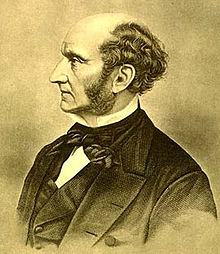Competition law theory
Competition law theory covers the strands of thought relating to competition law or antitrust policy.
Classical perspective

The classical perspective on competition was that certain agreements and business practice could be an unreasonable restraint on the
"A monopoly granted either to an individual or to a trading company has the same effect as a secret in trade or manufactures. The monopolists, by keeping the market constantly under-stocked, by never fully supplying the effectual demand, sell their commodities much above the natural price, and raise their emoluments, whether they consist in wages or profit, greatly above their natural rate."[1]
In The Wealth of Nations (1776) Adam Smith also pointed out the cartel problem, but did not advocate legal measures to combat them.
"People of the same trade seldom meet together, even for merriment and diversion, but the conversation ends in a conspiracy against the public, or in some contrivance to raise prices. It is impossible indeed to prevent such meetings, by any law which either could be executed, or would be consistent with liberty and justice. But though the law cannot hinder people of the same trade from sometimes assembling together, it ought to do nothing to facilitate such assemblies; much less to render them necessary."[2]
Smith also rejected the very existence of, not just dominant and abusive corporations, but corporations at all.[3]
By the latter half of the nineteenth century, it had become clear that large firms had become a fact of the market economy. John Stuart Mill's approach was laid down in his treatise On Liberty (1859).
"Again, trade is a social act. Whoever undertakes to sell any description of goods to the public, does what affects the interest of other persons, and of society in general; and thus his conduct, in principle, comes within the jurisdiction of society... both the cheapness and the good quality of commodities are most effectually provided for by leaving the producers and sellers perfectly free, under the sole check of equal freedom to the buyers for supplying themselves elsewhere. This is the so-called doctrine of Free Trade, which rests on grounds different from, though equally solid with, the principle of individual liberty asserted in this Essay. Restrictions on trade, or on production for purposes of trade, are indeed restraints; and all restraint, qua restraint, is an evil..."[4]
Neo-classical synthesis
After Mill, there was a shift in economic theory, which emphasised a more precise and theoretical model of competition. A simple neo-classical model of free markets holds that production and distribution of goods and services in competitive free markets maximizes
Contrasting with the allocatively, productively and dynamically efficient market model are monopolies, oligopolies, and cartels. When only one or a few firms exist in the market, and there is no credible threat of the entry of competing firms, prices raise above the competitive level, to either a monopolistic or oligopolistic equilibrium price. Production is also decreased, further decreasing
Chicago School

A group of economists and lawyers, who are largely associated with the
Robert Bork was highly critical of court decisions on United States antitrust law in a series of law review articles and his book The Antitrust Paradox.[15] Bork argued that both the original intention of antitrust laws and economic efficiency was pursuit only of consumer welfare, the protection of competition rather than competitors.[16] Furthermore, only a few acts should be prohibited, namely cartels that fix prices and divide markets, mergers that create monopolies, and dominant firms pricing predatorily, while allowing such practices as vertical agreements and price discrimination on the grounds that it did not harm consumers.[17] Running through the different critiques of US antitrust policy is the common theme that government interference in the operation of free markets does more harm than good.[18] "The only cure for bad theory", writes Bork, "is better theory".[16] The late Harvard Law School Professor Phillip Areeda, who favours more aggressive antitrust policy, in at least one Supreme Court case challenged Robert Bork's preference for non intervention.[19]
Other critiques
Some
This section needs expansion. You can help by adding to it. (June 2008) |
See Dominic Armentaro "Antitrust: The Case for Repeal" (Ludwig Von Mises Institute 1986) and "The Case Against Antitrust" by Robert A. Levy (Cato Institute 2004). The case being that "competition law" (or "Antitrust") is based upon a false view of economics - that it harms rather than benefits consumers in the long term. And that "competition law" (or "Antitrust") is based upon principles of law and philosophy that are both false and confused.
Policy developments
Anti-cartel enforcement is a key focus of competition law enforcement policy. In the United States the Antitrust Criminal Penalty Enhancement and Reform Act 2004 raised the maximum imprisonment term for price fixing from three to ten years, and the maximum fine from $10 million to $100 million.[21] In 2007 British Airways and Korean Air pleaded guilty to fixing cargo and passenger flight prices.[22]
These actions complement the private enforcement which has always been an important feature of
"Every violation of the antitrust laws is a blow to the free-enterprise system envisaged by Congress. This system depends on strong competition for its health and vigor, and strong competition depends, in turn, on compliance with antitrust legislation. In enacting these laws, Congress had many means at its disposal to penalize violators. It could have, for example, required violators to compensate federal, state, and local governments for the estimated damage to their respective economies caused by the violations. But, this remedy was not selected. Instead, Congress chose to permit all persons to sue to recover three times their actual damages every time they were injured in their business or property by an antitrust violation."
In the
See also
- Competition policy
- Consumer protection
- Herfindahl-Hirschman Index in market structure
- History of economic thought
- SSNIP
- Relevant market
- European Community competition law
- Irish Competition law
Notes
- ^ Smith (1776) Book I, Chapter 7, para 26
- ^ Smith (1776) Book I, Chapter 10, para 82
- ^ Smith (1776) Book V, Chapter 1, para 107
- ^ Mill (1859) Chapter V, para 4
- Kenneth Galbraith, The New Industrial State(1967)
- ^ Joseph Schumpeter, The Process of Creative Destruction (1942)
- ^ Whish (2003) p.14
- ^ Clark, "Towards a Concept of Workable Competition" (1940) 30 Am Ec Rev p.241-256
- ^ Markham, "An Alternative Approach to the Concept of Workable Competition" (1950) 40 Am Ec Rev p.349-361
- ^ c.f. Lipsey and Lancaster, "The General Theory of Second Best" (1956-7) 24 Rev Ec Stud 11-32
- ^ Continental T.V., Inc. v. GTE Sylvania Inc., 433 U.S. 36 (1977), Broadcast Music Inc. v. Columbia Broadcasting System, Inc., NCAA v. Board of Regents of Univ. of Oklahoma, Spectrum Sports Inc. v. McQuillan, State Oil Co. v. Khan, Verizon v. Trinko, and Leegin Creative Leather Products, Inc. v. PSKS, Inc.
- ISBN 978-0-226-67576-3
- ISBN 978-0-7355-6354-4
- ^ Posner (2001) p.24-25
- ISBN 0-465-00369-9
- ^ a b Bork (1978) p.405
- ^ Bork (1978) p.406
- ^ Frank Easterbrook, The Limits of Antitrust, 63 U. Tex. L. Rev. 1 (1984).
- ^ Brooke Group v. Williamson 509 US 209 (1993)
- ^ For a criticism of the libertarian view see Michael E. DeBow (2007) What's Wrong with Price Fixing: Responding to the New Critics of Antitrust, published by the Cato Institute Archived 2007-09-30 at the Wayback Machine
- ^ see generally, Pate (2004) at USDOJ
- ^ see, USDOJ Antitrust's press release Archived 2007-08-08 at the Wayback Machine and the court filing
- ^ Hawaii v. Standard Oil Co. of California 405 U.S. 251, 262 (1972)
- ^ Damages actions for the breach of the EC antitrust rules {SEC(2005) 1732} /* COM/2005/0672
- ^ see FAQ on the Green paper here
References
- ISBN 0-465-00369-9
- Bork, Robert H. (1993). The Antitrust Paradox (second edition). New York: Free Press. ISBN 0-02-904456-1.
- Friedman, Milton (1999) The Business Community's Suicidal Impulse
- Galbraith Kenneth(1967) The New Industrial State
- Mill, John Stuart (1859) On Liberty online at the Library of Economics and Liberty
- ISBN 978-0-226-67576-3
- ISBN 978-0-7355-6354-4
- Prosser, Tony (2005) The Limits of Competition Law, ch.1
- Schumpeter, Joseph (1942) The Process of Creative Destruction
- Smith, Adam (1776) An Enquiry into the Nature and Causes of the Wealth of Nations
- Wilberforce, Richard (1966) The Law of Restrictive Practices and Monopolies, Sweet and Maxwell
- Whish, Richard (2003) Competition Law, 5th Ed. Lexis Nexis Butterworths
Further reading
- Elhauge, Einer; Geradin, Damien (2007) Global Competition Law and Economics, ISBN 1-84113-465-1
